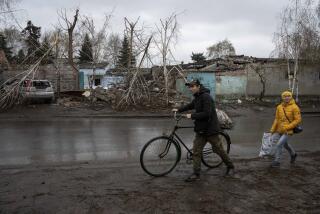FBI Reportedly Studies Possible Yucca Mountain Fraud
WASHINGTON — The FBI is investigating possible document falsification by workers on the Yucca Mountain nuclear waste dump project in Nevada, a congressional staffer said Wednesday.
Chad Bungard, deputy staff director and chief counsel for a House Government Reform subcommittee, said he learned of the probe from the inspector general’s office at the Department of Interior, which also was investigating.
“I think they’re doing the right thing by pursuing the criminal matter in this case,” he said.
FBI spokesman Bryan Sierra declined to comment.
Bungard’s panel is holding a hearing on the possible document falsification next week, and staffers are preparing to release e-mails from a U.S. Geological Survey hydrologist that suggest the falsification occurred.
The e-mails were written from 1998 to 2000 and circulated among scientists studying how water moves through the planned dumpsite, a key issue in determining whether radiation could escape, and how much.
USGS scientists validated Energy Department conclusions that water seepage was relatively slow, so radiation would be less likely to escape.
The Energy and Interior departments revealed the existence of the e-mails March 16, and handed them over Tuesday to the House Government Reform subcommittee on the federal workforce and agency organization.
The subcommittee, led by Rep. Jon C. Porter (R-Nev.), plans to make redacted versions public on Friday.
“We don’t want to compromise the criminal investigation,” Bungard said, adding that the agencies were doing the redacting.
The Energy Department inspector general is also investigating the suspected document falsification, and the department is conducting a scientific review as well.
The revelation about the potentially falsified documents was the latest setback to the planned dump 90 miles northwest of Las Vegas.
Yucca Mountain, approved by Congress in 2002, is planned as the nation’s only underground repository for 77,000 tons of defense waste and used reactor fuel from commercial power plants. The material is supposed to be buried for at least 10,000 years.
But the project has suffered serious problems, including funding shortfalls and an appeals court decision last summer that is forcing a rewrite of radiation exposure limits for the site. The Energy Department recently abandoned a planned 2010 completion date, and department officials have not given a new date.
Also Wednesday, Bechtel SAIC, the Energy Department’s lead contractor on the Yucca project, said its top scientist on the project had taken early retirement.
Bechtel spokesman Jason Bohne in Las Vegas said the departure Tuesday of Michael Voegele, who had worked on the Yucca project for some two decades, was unrelated to the controversy over the USGS e-mails.
More to Read
Sign up for Essential California
The most important California stories and recommendations in your inbox every morning.
You may occasionally receive promotional content from the Los Angeles Times.










